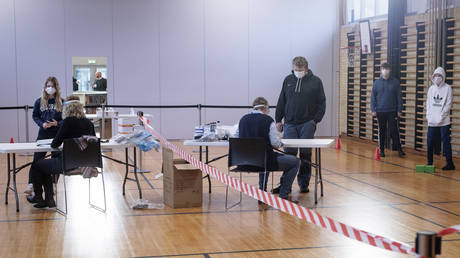
Coronavirus will no longer be classed as “socially critical” disease in Denmark starting next month
Denmark has announced that it will remove almost all Covid-19 restrictions as it no longer considers the virus to be a “socially critical disease,” nearly two years after the start of the global pandemic.
“Tonight we can shrug our shoulders and find the smile again. We have incredibly good news, we can now remove the last coronavirus restrictions in Denmark,” said Denmark Prime Minister Mette Frederiksen on Wednesday, revealing that the bulk of the restrictions would be dropped by February 1. The only measure that would remain in effect for the time being is the requirement to take a Covid-19 test before entering Denmark from abroad.
Frederiksen noted that while “it may seem strange and paradoxical” that the restrictions would be removed as Denmark experiences its highest infection rates to date, she pointed to the drop in the number of patients in intensive care, crediting widespread vaccination against Covid-19 for severing the link between the number of hospitalizations and that of infections.
Health Minister Magnus Heunicke stated that there has been a “decoupling between infections and intensive care patients, and it is mainly due to the large attachment among Danes to revaccination.”
“That is the reason why it is safe and the right thing to do now,” he claimed.
Heunicke announced on Tuesday that Covid-19 would no longer be considered a “socially critical disease” from February 1.
According to the World Health Organization (WHO), Denmark has recorded 3,635 deaths since the beginning of the pandemic and nearly 1.5 million cases. An overwhelming number of the cases were recorded in the past two months alone, however deaths in the country peaked in December 2020. Some 80% of Danes have been vaccinated with two doses of the Covid-19 vaccine, while half of the population has already received a booster shot.




